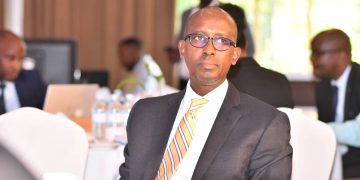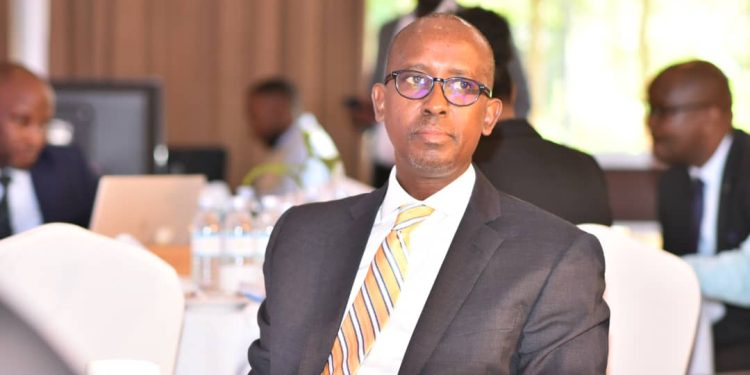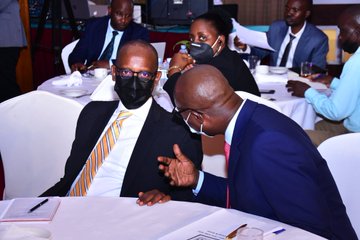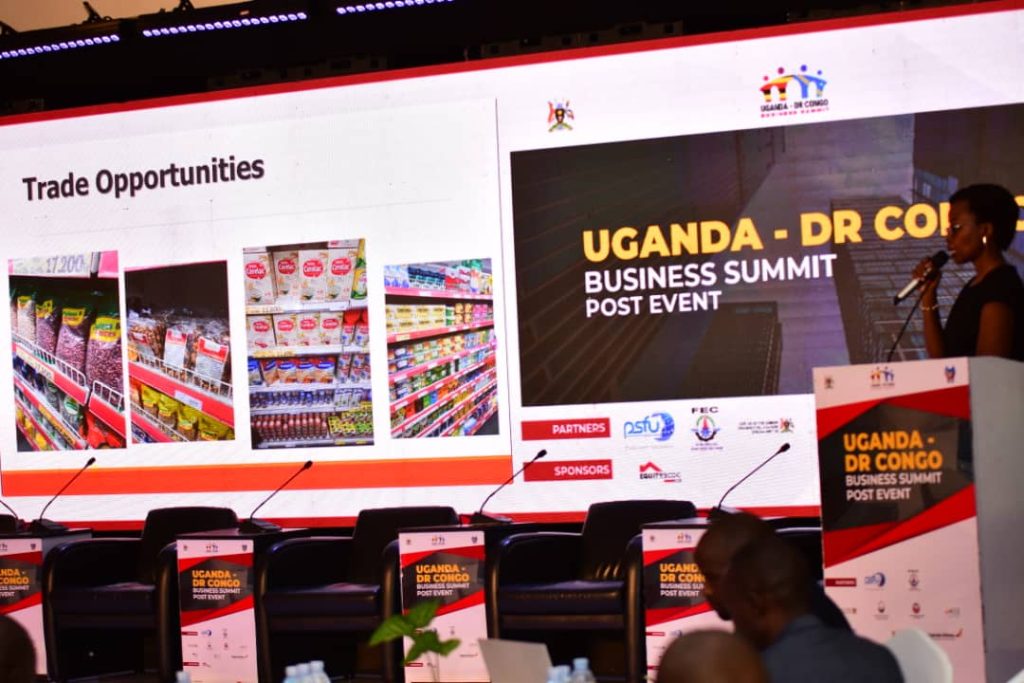Odrek Rwabwogo, entrepreneur and senior Presidential Advisor – Special Duties, has said the Uganda-DRC Business Summit has already started to bear positive fruits.
“A month after our DRC trade mission, we needed to give a report on progress yesterday,” he tweeted on Friday.
He added: “So happy 10 companies have already taken orders for eggs, chicken, mushrooms & IT services. Our chicken sales target alone is USD350m by 2028. So happy Entrepreneurs are responding to the call!”
Kinshasa summit
Speaking during the closing ceremony of the first leg in Kinshasa on June 3, 2022, Rwabwogo said trading and exports require effective and genuine unity to enter complicated markets that have low information, multiple languages and culture and unreliable data as this one.
“We can’t talk ourselves into markets. We have to work hard at unity to get in together.”
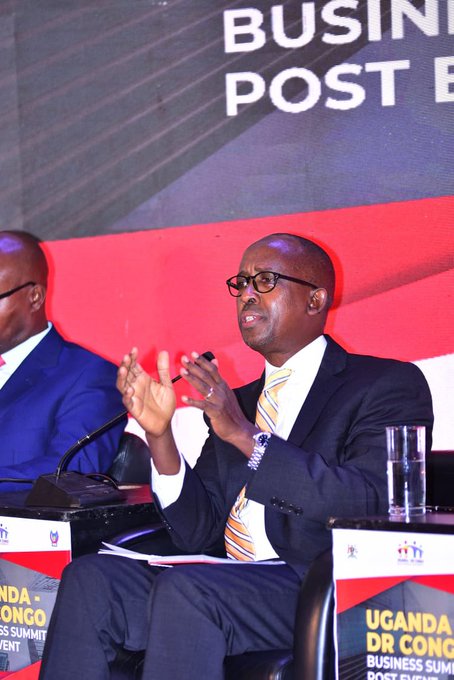
“All we need to grow youth enterprises and scale our business is here- the reason 200 business people came with us for these two weeks and so far have signed off 300 deals in the few days we did B2B sessions. I am so hopeful that this unity we have shown to the market we can keep. This is the only way we will de-risk logistics, transportation, warehousing etc and ensure both the big and the small businesses, get a piece of the action.”
He looked forward to the 12 sectors: coffee, fish, grains, sugar, cement, dairy, beef, tourism, steel and cement, and bananas, which can now make a strong showing in this market and help increase national earnings.
“I need all of us to not waste time in silos and focus on this market. Private Sector Foundation Uganda (PSFU) board should have a dedicated strategy and staff for this effort in the DR Congo market.”
Rwabwogo said he was happy seeing the beginning shoots of the awareness that capital, skill and investment only grow better from local African companies working together not waiting on Transnational Corporations (MNCs) which have less mental and social attention to these young markets.
To have joint market deals means we begin to weigh and measure each other as corporates, understand each other and raise funding to meet our needs jointly, he said.
“This is how manufacturing and industry emerges and local capital is built. Policies that protect our local businesses will emerge from this mindset about our nations.”
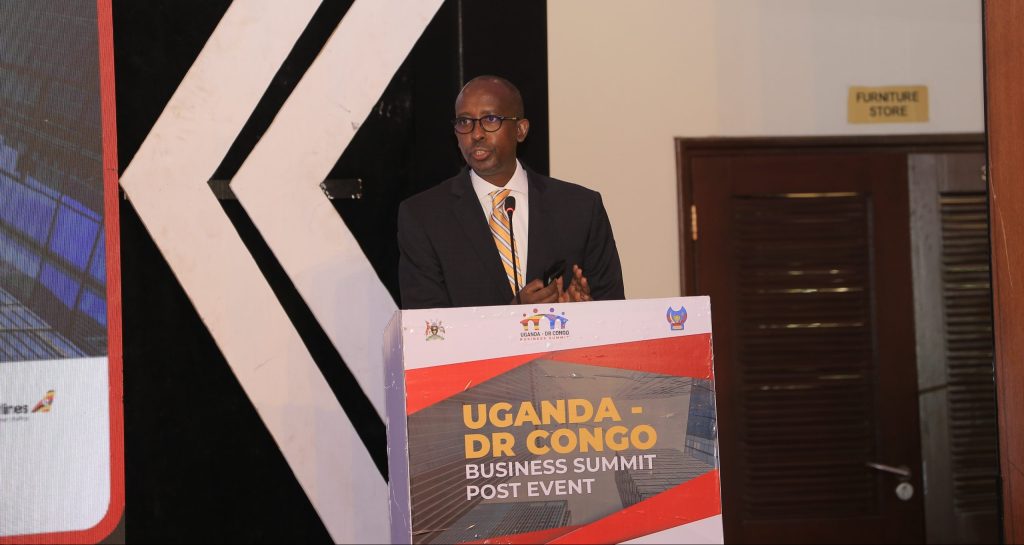
He thanked President Felix Tshishekedi and President Yoweri Museveni for leading the charge to unite “our markets and for supporting our stay here”.
President Museveni chartered an aircraft for the Ugandan delegation on its second leg to Goma.
Rwabwogo further thanked the pioneers in the Market – Emmanuel Barigye and his Dynapharm team, Movit cosmetics, Mukwano, Mr Kinene and his transportation group, saying “pioneers take heavy risks to get us all to a better place”.
He said he was looking forward to the effort to set up a joint warehouse and cold room for Ugandan goods “here so that we can slowly get this market to taste our products fully”.
Goma summit
While opening the second leg of the business summit in Goma on June 6, Rwabwogo called the eastern DR Congo town “an area with strong historical links to the greater Eastern Africa”.
He said Lake Kivu, one of Africa’s and perhaps one of the world’s deepest lakes that lies on the extreme western side of the Albertine Rift Valley, holds many historical secrets in culture, customs and trade with east Africa in the last 500 years.
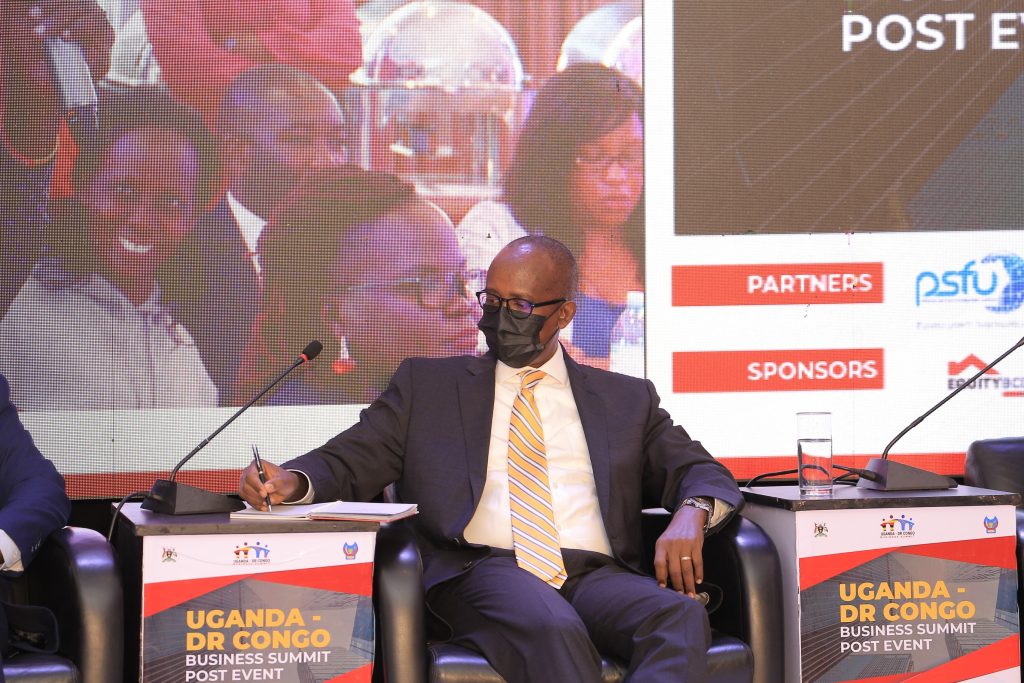
At the beginning of the 19th century, for example, trade in iron products (spears, hoes and bracelets) agricultural commodities such as cattle and goats from Masisi hills, legumes, fish, etc flourished here, he narrated.
He said that trade along with the southern lake of Tanganyika, connected the western tribes of Uganda and Northwest Tanzania- the Banyambo, the Baziba, the Wagaba all of Tanzania today and the Banyoro, Batooro, Banyankore; and even the northern groups of the Alur, Lugbara, Acholi along with the Baganda of present-day Uganda.
“The lake connected all of us with the lacustrine tribes in Rwanda and the peoples of mid-eastern Congo. These are the forest people called the Lega, the Tembos and Nyanga societies that led trade from here.”
“The trade in Ivory, iron and food products which we know often ended up supporting the small kingdoms of Busongora and Nkore making them richer than they were meant to be, was very autonomous of many of the political entities and kingdoms of the Great Lakes and it flourished regardless of who was in control.”
He said trade on this lake where the towns of Goma and Gisenyi are situated, was the earliest expression that money knows neither kings and queens nor boundaries.
Stability is key to trade, stated Rwabwogo, adding that trade also connected the east coastal Swahili groups from Mombasa, Pemba, Kilwa, Zanzibar and Malindi, thriving towns pre-Portuguese invasion in 1505 – with the Congo and the Uganda hinterland.
“This connection is very much alive today and even more needed given the increase in our populations and the demand for stability and wealth for Africa.”
Three strategic propositions
While appreciating Goma Governor Gen Ndiima Kongba and the Mayor for the warm hospitality, Rwabwogo said Goma city already carries big percentage of trade relations with Uganda.
Here is what he proposed:
1) We bring you a number of Ugandan SMEs that will share products (dairy, meats, coffee, tea, cement, sugar, cables, poultry etc) and services such as Accounting, tech, medicine, education etc. Together we can build skill, good partnerships and trade that will give us a better capital base for both our countries. In this market, consumption, prices and demand is high yet the need for patents and R&D is still very low which allows us to grow together.
It means our businesses can grow organically and at a good pace together with yours! When we become stronger together through this exchange, we will build a base that multinational capital (MNCs) which tend to stop local capital formation in developing countries, loses the incentive to come and constrain our growth. When they come as they will, they will be our partners not competitors. Let me give you an example. In Kinshasa, we were driven in executive Hyundai cars from Korea for the last five days.
2) When we achieve the first objective, above, now we enter a new phase, a very critical one – that of joint processing of raw materials from here. The best timber, fish, coffee, dairy and beef, fruits and vegetables lie along the 700km border line from Arua to Goma on both sides of our border. Let me show you why this is important.
The west always wants to keep us in primary products – minerals, crude oil, timber etc. Can we not really stand together as businesses and pursue policy change in this space so we can make batteries for example from here, now that we are all EAC? It all starts with thoughts of cooperation at business level to force this change. This summit should be a good start. Let’s us work when the sun is up. These are good days and they might not return for Africa if we miss this window.
3) Finally, we need a point of contact to keep our business relationship working and growing. To have spent time here and study the market and we don’t leave a point of unity for trade, would be wrong! I have, therefore, asked the leadership of PSFU, FEC in DRC, our ministries of trade and MEACA, to find and fund a joint Uganda/DRC cold chain or warehouse to allow industrial and agricultural products to be stored longer here for the market to taste and adapt to them.
There are first-class business firms I have seen here that can participate in setting up and managing these facilities. We could start with Goma and then Beni and eventually Kinshasa. This will facilitate trade and introduce such things as insurance, export credit fund and make banking easier for businesses here and Uganda. It will also answer the matter of demand versus capacity of the market here and out businesses.
